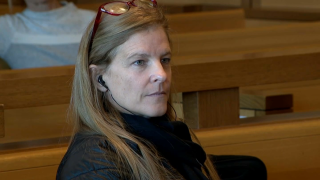
Witnesses have wrapped up testimony in a suppression hearing ahead of Michelle Troconis’ trial in January.
Troconis’ lawyer wants statements made in her interviews with police suppressed for the trial, arguing they were given because of coercive tactics and Troconis’ constitutional rights were violated. But investigators into the disappearance of Jennifer Dulos deny any wrongdoing, and maintain everything was relevant to the investigation.
“We have been checking out every aspect we can of your story and your story has some significant problems,” then-detective John Kimball said in Troconis’ second interview with police following her arrest in June of 2019.
Kimball wrapped up his testimony Monday with Troconis’s lawyer Jon Schoenhorn pressing him on tactics used in interviews.
Get top local stories in Connecticut delivered to you every morning. Sign up for NBC Connecticut's News Headlines newsletter.
“These things are coercive techniques and I intend to show that makes what she said unreliable and does not constitute a waiver of rights,” Schoenhorn said.
Schoenhorn is arguing statements made in the interviews shouldn’t make it to the full trial set to start Jan. 8. On the basis police lied to Troconis about evidence they had, mislead her on the timeline she had previously given them from the day Jennifer Dulos disappeared, and leveraged Troconis’ daughter and mother against her.
“You want to see them right, you don’t want to go to prison, you don’t want to be charged for murder?” Kimball said in the interview.
Local
The state maintains no harm by investigators was done, saying Troconis understood what investigators needed. Investigators' say their issue was with her changing story during the thick of the investigation.
“We noticed that her statements were providing alibis for herself and there were inconsistencies in her statements, which lead us to believe she was lying,” Kimball said.
When Kimball wrapped testimony, two more witnesses were called. The first was tossed out - the judge deciding he was irrelevant to the suppression hearing. The second, a state police sergeant in 2019 at the Litchfield troop L barracks.
Troconis’ attorney has been arguing she was treated unlawfully when she went to the barracks to have a DNA sample taken, fingerprints taken and photographs done. She was stripped to take the photos - something Schoenhorn argues should have never happened, and it was an attempt to humiliate Troconis, and pry information out of her.
But the state again maintains protocol was followed; a female trooper was called in to take the photos, and they were handled appropriately once downloaded for evidence.
The judge still must watch a third interview investigators conducted with Troconis back in August of 2019 and oral arguments need to be heard before he can make a decision on the motion to suppress the first two interviews.
Schoenhorn is hopeful for a decision on suppression by the end of the year.



